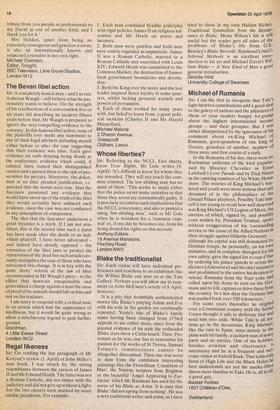The Bevan libel action
Sir: A completely honest man–and! so rate Auberon Waugh – will believe what he passionately wants to believe. On the strength of his recollections of a conversation five or six years old describing an incident fifteen years before that, Mr Waugh is prepared to ignore the very compelling evidence to the contrary. In this famous libel action, none of the plaintiffs ever made any statement to any of their legal advisers including myself either before or after the case suggesting that their evidence was false. Each gave evidence on oath denying being drunk at the conference, evidence which could, if refuted, have ruined their distinguished careers and exposed them to the risk of prosecution for perjury. Moreover, the defendant at no time pleaded justification, i.e. asserted that the words were true. Had the Spectatbr possessed any evidence that would have stood up of the truth of the libel they would certainly have adduced such evidence, since the case was not conducted in any atmosphere of compassion.
The idea that the Spectator underwent a great injustice is a myth. If! am not mistaken, this is the second time such a claim has been made after the death of an individual plaintiff. I have never advocated – and indeed have stoutly opposed – the extension of the libel laws to protect the reputations of the dead but such attacks certainly strengthen the case of those who have advocated this change. It is in key with the quite 'dotty' reform of the law of libel recommended in Mr Waugh's piece – to the effect that however irresponsible and generalised a charge against a man the onus of proof of its untruth should fall on him and not on his traducer.
I am sorry to respond with a critical note to an article which had the appearance of kindliness, but it would be quite wrong to allow a mischievous legend to gain further ground.
Goodman,
4 Little Essex Street
London WC2


































 Previous page
Previous page